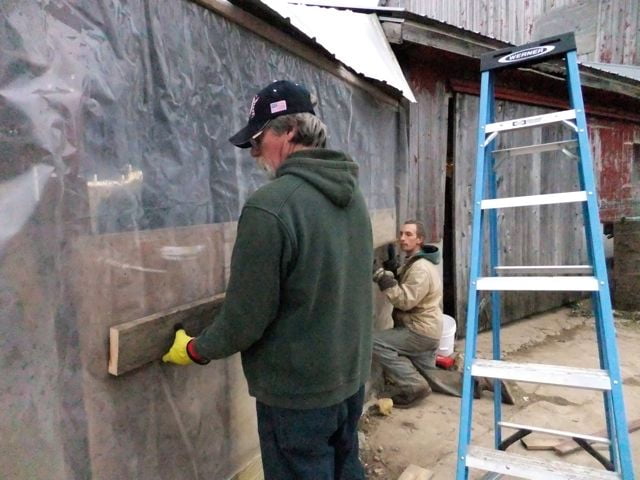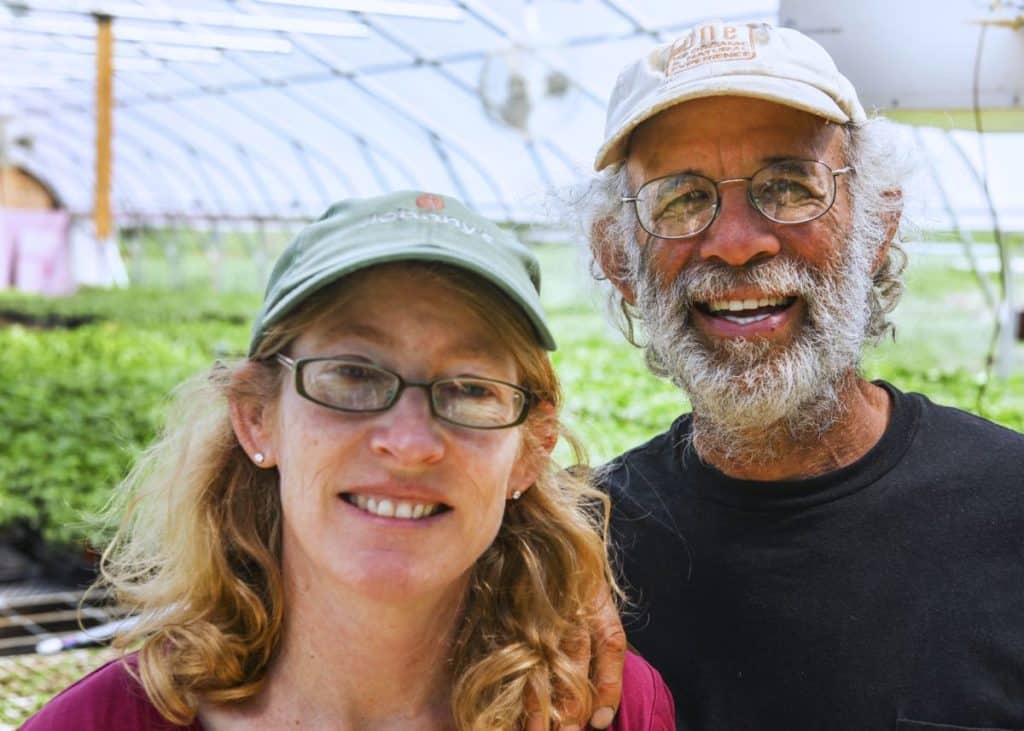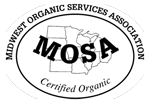Winter share, delivery #1
- On: November 20, 2013
 0
0

Larry and Noah winterize the outdoor washroom. It’s too cold to work in this space during winter but we appreciate the protection from wind and snow drifts. We will store equipment in here until spring.
Things you need to know about your winter share.
* Your delivery will consist of two different boxes, labeled “A” and “B”. The boxes contain different vegetables. Take one “A” box and one “B” box.
* Please pick up your boxes on the day of delivery, during the normal hours for your site. Don’t count on picking up late or the next day. It will be cold during the deliveries and the produce may freeze overnight at the unheated sites.
* We are sending all of the winter squash in this first delivery.
* Don’t feel that you have to eat all this food before the second delivery! Much of it will store quite well. See below.
* The second (and final) winter share delivery will be on Thursday December 12 (Madison, Middleton, Oregon and Evansville) and Friday December 13 (Milwaukee area, Janesville).
* Local Thyme is not supplying specific recipes for the winter boxes. However, we have access to the entire catalog of Local Thyme recipes all winter. Check them out for your Thanksgiving ideas.
Winter share strategy
* These vegetables are the most perishable: scallions, bok choy, and butternuts with flaws.
* These are the next-most perishable: cranberries, leeks, Brussels sprouts, butternut squash. Watch your winter squash closely and use quickly if you see any signs of deterioration.
* These will last the longest: Beauty Heart radish, beets, carrots, garlic, onions, potatoes, sweet potatoes.
Veggie List and Storage Info (winter share, delivery #1)
Box “A”
Butternut squash, 1 large and 1 medium
Satina yellow potatoes, 5 lb
Adirondack Blue potatoes, 3 lb
Sweet potatoes, 5 lb
Garlic, 1 small bulb
Box “B”
Beauty Heart winter radish, about 2
Golden beets plus some “Badger Gold” beets, 3 1/3 lb total
Brussels sprouts, 1.5 lb
Carrots, 5 lb
Cranberries, 1 pint
Leeks, 3 lb
Scallions, 1 bunch
Yellow onions, 5 lb
Bok choy, 1 medium head
Here’s what we think will be in the December delivery: beets, green cabbage, red cabbage, carrots, celeriac, leeks, onions, parsnips, russet potatoes, yellow potatoes, rutabaga, sweet potatoes, Beauty Heart winter radishes.
Beets – Refrigerate in a plastic bag. Beets will store for two months or longer. You will receive a mix of golden beets (2 1/3 lb, round, gold inside) and “Badger Gold” beets (1 lb, longer, russeted skin on shoulders, striped inside). Remember our collaborative carrot trial with research scientists from UW/Madison this summer? “Badger Gold” was developed by Prof. Irwin Goldman of the Horticulture Department. It will be one of the first varieties to be released through the radical Open Source Seed Initiative (OSSI). It is an excellent, sweet golden beet, with lovely concentric rings inside. Irwin says it is even good raw. We were thrilled that Irwin offered us a bit of seed to try this year. It is not available for sale yet, so this is the farmer-equivalent of getting past the velvet rope at an exclusive club.
Bok choy – Refrigerate and use soon.
Carrots. Refrigerate in a plastic bag. Will keep for several weeks.
Cranberries. Refrigerate. Freeze if you don’t expect to use within several weeks. These organic cranberries are from Ruesch Farms in central Wisconsin. They are of very beautiful quality because they were harvested by ‘dry raking’ instead of a wet harvest in which the field is flooded. Brian Ruesch says that dry raking is more work for them but preserves the quality and storage life of the cranberries.
Garlic. Can be stored at room temperature. As I mentioned in previous newsletters, the midwestern garlic crop failed this year so we only have one small bulb for each of you.
Leeks. Refrigerate and eat within three weeks. Leeks are not a long-storage crop. You may need to strip off one or two outer leaves to freshen the leeks before you cook them.
Onions: Store in a cool, dark spot or refrigerate. Protect from light. Exposure to light stimulates sprouting.
Potatoes: Can be stored at room temperature or in a cool spot, but must be kept in the dark, or they will turn green. They will store longer if kept cool. Around 40 – 50 F is ideal. Keep them in the paper bag we sent them in, or cover the potatoes with a cloth. The potatoes are from Chris Malek of Malek Family Stewardship Farm. Everyone will receive 5 lb. Satina potatoes. These have light yellow flesh and are a good all-purpose potato. Everyone will also receive 3 lb of blue-fleshed potatoes. They are a pretty addition to roasted potato dishes.
Sweet potatoes – Wow, the sweet potato crop turned out so well this year. These are the Covington variety, and have developed excellent flavor and sweetness. Store at room temperature, no lower than 55 F. Keep them on your kitchen counter where it’s easy to keep an eye on them. The roots come in a wide ranges of sizes and all are good. The sweet potatoes are not washed. We don’t like to wet them this time of year without a warm place to dry them.
Winter squash – You will receive two butternut squash, one large and one medium. Almost all are our Waltham variety which tends to grow big squashes. Some squash have minor flaws. Identify and use that squash first. Store winter squash in a cool, dry place. 50 F is ideal. Do not put in a plastic bag. Inspect your squash frequently and cook if you see any soft spots developing. You can cook, mash and freeze the squash for future use. I find that you can refrigerate cut raw squash for up to one week. This runs counter to the accepted way to store squash, but is useful if you want to cook just half a squash at one time. Try microwaving your squash for one to two minutes before cutting or peeling. This softens the squash and makes large butternuts easier to handle.
What are you planning for your Thanksgiving meal?
I thought I’d share our plans. We are a family of cooks. We plan to prepare a heritage breed turkey from Matt Smith at Blue Valley Gardens, brined overnight (Beth), stuffing (Beth’s mom), Brussels sprouts with garlic-mustard vinaigrette (Steve), roasted sweet potatoes (Sophie), glazed butternut squash (Beth), crunchy carrot-Beauty Heart salad with sesame-seed dressing (Steve), homemade applesauce (Ari), pickles (Ari), cranberry sauce (friends), and apple pie (Sophie). We love Thanksgiving!
Leek-Vegetable Fritters With Lemon Cream
While packing CSA boxes, crew member Jon rapsodized about a leek fritter recipe he enjoys. It was a chilly day and we were getting hungry. I think every person went home and made those leek fritters, including me. They are tasty and mild, true comfort food. I’ll list the ingredients here, and you can read the recipe online. We skipped the sour cream and used Greek yogurt instead. The recipe is from Deb Perelman of Smitten Kitchen.
For the fritters:
2 pounds leeks, pale green and white parts only (or use 1 pound leeks and 1 pound cooked vegetables like carrots, potatoes, summer squash, beets, zucchini)
Salt
2 scallions, trimmed, halved lengthwise and thinly sliced
1/4 cup all-purpose flour
1 teaspoon baking powder
Freshly ground black pepper
Pinch cayenne
1 egg
Vegetable oil, for frying
For the cream:
1/2 cup sour cream
1 tablespoon freshly squeezed lemon juice
Pinch freshly grated lemon zest
Salt
Read the recipe here.



